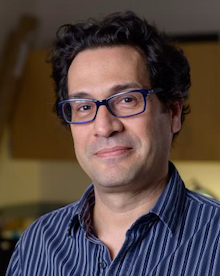
When life presents many competing demands, it’s difficult to maintain balance during the semester. Or maybe it’s a “normal” semester–but there’s a particular course where students feel they have little control over what happens. Expectations are unclear, “curved” grading pits students against one another, and opportunities for assessment and/or feedback are limited. Brains yell “danger”– learning in this course isn’t safe!
- What steps do you take to help students balance the stresses inherent in the course?
- What is one way in which you balance challenging your students with alleviating undo stress?
- How do you assess your students’ well-being throughout the semester?

Greg Durgin, Electrical and Computer Engineering
I help students maintain equilibrium by providing the following:
- Balanced workload.
- Ample “runway” for completing assignments.
- Interesting group projects to foster teamwork and social interaction.
- Grading scheme that de-emphasizes a single bad test day.
- Attendance (physical and online).
- Office hour engagement.

Jeffrey Davis, Electrical and Computer Engineering
I feel that as faculty we should try to be as flexible as we can with deadlines of tests. I typically will set my test times early in the semester, but as the date gets closer I will try to listen to student concerns when they have tests in other classes on the same day or week. It is not always possible, but I think that the students appreciate the faculty taking time to try to help them in this way.
Project and homework deadlines are a little more difficult to have flexibility, but having a late-policy that is fair and not so draconian can help students with their stress. Even small things like having a linearly graded submission penalty that is based on the resolution of hours and not days can help give the students just a few more hours to work on a homework or project without significant penalty; this can make a big difference in a student’s stress at night.
To assess students’ well-being, I typically just ask students periodically at the end of class. Usually I start individually, and then if I see a pattern I will ask the classroom as a group.

John Cressler, Electrical and Computer Engineering
I let them know I value work-life balance….and talk about how I manage it in my own life. Be understanding to the needs to students.
I get to know them…..assess often and much how they are acting/responding.

Andrei Fedorov, Mechanical Engineering
I engage in regular one-on-one conversations with students on the topics outside of the course to make the connection with students on a personal level.
You can observe stress on many levels from how students are attuned to what is happening in the class, how they ask questions, how they look or react … you just need to pay attention at the students as people, and you’ll quickly get a sense if something is off or things are well.
To assess students’ well-being, I typically just ask students periodically at the end of class. Usually I start individually, and then if I see a pattern I will ask the classroom as a group.

Kate Pride Brown, History and Sociology
I give students flexibility in selecting their own due dates for assignments. I tell them the parameters of the assignment and let them choose the date or week when they would like to complete it. That way they can take into account the requirements of their other classes. They won’t have to face the stress of having a major assignment due to me on the same day as a mid-term exam in another class.
I don’t use grades as cudgels. I give qualitative feedback and I offer the opportunity to re-do an assignment for a higher grade. I think worrying about grades is counter-productive. I don’t want them thinking about the grade when they do the assignment, so I try to make assignments pass-fail or with the opportunity to revise for a higher grade. I try to create assignments that are inherently challenging, but where the grade is low-stakes, so that doing the assignment in and of itself will stretch the student intellectually, without the pressure of having a grade attached to it.
I usually start class saying, “How are we doing today?” and look around until someone answers. While I don’t expect that anyone will pour their heart out in front of the entire class, I think it signals to students that I care so that, if they ever do need to talk, they will feel comfortable approaching me. When students come talk to me individually, either in office hours or after class, I make a point of asking them how they are doing overall.

Ignacio Taboada, Physics
I define expectations clearly at the beginning of the course. I go over all graded items in details. Lack of knowledge of expectations are a source of stress in students.
I design my classes being mindful of the credit hours for the class. This includes me doing all the HW / Projects / tests / other to make sure that the time needed to complete is what I expect.

Sal Barone, Mathematics
What steps do you take to help students balance the stresses inherent in the course? We try to schedule the assignments so that not too many assignments fall in the same week, or within a day or two of each other. The week before an exam does not contain the weekly quiz, that is usually present during any other week (also the week **of the exam** does not have a quiz either). The schedule is designed so that the most effective strategy is consistent study habits (not cramming). Weekly quizzes, MyMathLab homework, and exploration assignments are typically much shorter or non-existent during an exam week, and the week leading up to an exam, so that the students can focus on studying for the exam.
What is one way in which you balance challenging your students with alleviating undo stress? We have spent considerable effort and thought trying to streamline the course to eliminate unnecessary work for the students. That being said, the course Math 1554 Linear Algebra tends to be very challenging for even the best students. While it is possible to do well (at least a B) with just maintaining the assignments (which tend to be mostly graded by completion), in order to do very well (an A) it is usually much easier if the student actually learns **linear algebra** and not just the mechanical ways to solve a finite list of problems. The task of learning linear algebra and what it actually means when you solve problems, and to some extent why the methods work, is already a very challenging goal for the students; but this is something that we strive to provide and have designed the curriculum so that this goal is achievable by any student who puts forth the required effort to complete the course.
How do you assess your students’ well-being throughout the semester? We have several check-ups given throughout the semester, administered through Canvas. Also, I sometimes hold informal polls during class. I also speak with many students during office hours and can get a sense of the emotional topography of the students by speaking with a sample of them in person on a one-on-one basis.

Mary Hudachek-Buswell, Computer Science
All assignments are clearly delineated at the start of the course. I have entered all assessments into the canvas calendar so that they can view when assignments are due. I plan my exams around other course exams that the students will likely take during the same semester as my course. I try to choose a different day of the week to avoid multiple CS exams in a single day.
I plan the semester around the exam dates. If a week has an exam, then I schedule a homework to be 2 weeks long to give them a break from doing homework the week of the exam.
Before every exam, I do a thumbs up/thumbs down survey in the lecture. I also share the counseling center’s contact information.

Rosa Arriaga, Interactive Computing
I try to help balance stress by providing students with an opportunity to have some agency around class deliverables. The following are some specific strategies I employ to help students balance stress.
- I allow students to meet in groups and redistribute 5% of the course grade from one category to another (e.g., add +5% to quizzes and take -5 from exams).
- I allow students to drop up to 3 exams (I take best 6 of 9 quiz grades).
- I have 3 deadlines for the research paper.
- calendar extra credit–5pts for Exam1- in the beginning of the term if they enter all the due dates from my course and other courses– this provides them with a sense of what their semester will be like and it allows them to plan for their quizzes or their research paper deadline.
- I provide study guides for the exams.
- I spend 10-15 minutes of each class answering questions in one-one format– students can either meet with me or with their GTAs.
One way I balance challenging students with alleviating undo stress is providing students with detailed rubrics for the term papers and couple this with an option to get feedback from the GTAs.
While I do not formally assess student well-being, I constantly remind students that (1) we are in a pandemic and we must mindfully practice: patience, kindness, and integrity; (2) GT has excellent counseling services; there is no shame in seeking support.
